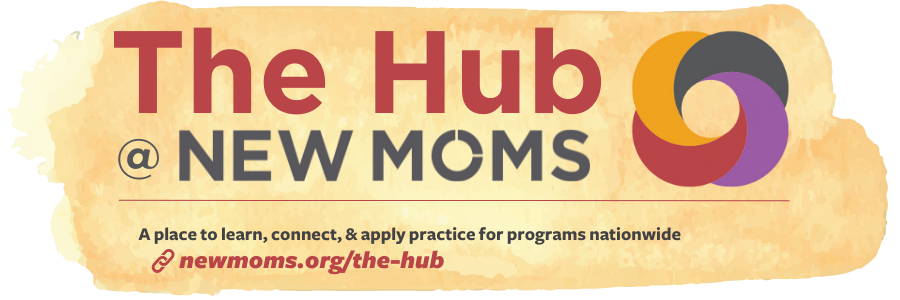Chicago-based nonprofit New Moms has launched an Academic Coaching program to challenge systemic barriers preventing many young mothers from completing college degrees.
One in five college students in the United States are parents, and often schools cannot fully provide the kind of support young parents need to ensure success. Currently, only 8% of single mother students in Illinois complete an Associate degree within six years, according to the Institute for Women’s Policy Research. Additionally, one in three black women in college — who are already underrepresented in higher education because of systemic racism and historic barriers — are single parents. New Moms’ Academic Coaching program was created to address this disparity.
Together with the City Colleges of Chicago, New Moms is piloting a three-year program to increase degree attainment for young moms in Chicagoland. The results of this project will directly inform the fields of postsecondarypersistence and workforce development, and will be evaluated by Chapin Hall at the University of Chicago.
“City Colleges of Chicago is dedicated to eliminating barriers and addressing inequities that impact access to higher education for underserved communities,” said Juan Salgado, Chancellor of the City Colleges of Chicago. “We are grateful to partner with New Moms in the mission to increase entry to college. The new Academic Coaching program is a powerful example of our shared investment in supporting young parents as they pursue theireducation.”
Postsecondary completion also has an outsized return on investment (ROI). Single mothers in Illinois holding an Associates or Bachelors degree are 45% and 67% less likely, respectively, to live in poverty than high schoolgraduates.
ECMC Foundation, which is funding a significant portion of the pilot program, is making this intentional investment in the postsecondary persistence and achievement of young moms, anticipating that this will have lasting positiveinfluences on families and communities and will lead to more mothers of color graduating from college and working in family-sustaining, living wage jobs. This pilotprogram is also funded in part by the State of Illinois.
The pilot recruited 25 Chicagoland young moms pursuing an academic certificate or Associate degree at theaccredited institution of their choice. Most have selected City Colleges of Chicago, a partner of New Moms. During the program, each participant will receive monthly support including a $500 monthly stipend while enrolled in the program, individual and group coaching, as well as transportation and childcare support. Young moms may remain enrolled in the program for up to three years or until they complete their degree, with additional follow-up supportoffered post-graduation.
“Research shows that holistic support, including financial support, is one of the most effective ways to improve outcomes for low-income students,” said Gabrielle Caverl-McNeal, Senior Director of Employment and Academic Coaching at New Moms. “Student-parents facing scarcity and poverty achieve their goals more frequently when their environments are less stressful, when they have the support of positive relationships, and when they have developed core life skills.”
These brain and behavioral science-based principles — reducing sources of stress, building responsive relationships, and strengthening core life skills — provide the basis for the Academic Coaching program.
“New Moms has successfully integrated insights from brain and behavioral science into our existing programs andwe’ve seen the positive impact on young moms and their children,” said Melanie Garrett, Chief Program Officer at New Moms. “These include increased feelings of belonging and connection, economic mobility, and family well-being.”
Evaluation of this project will have significant implications for the fields of postsecondary persistence and workforce development. Chapin Hall at the University of Chicago will conduct a formative evaluation of the pilot, which willinclude the collection and analysis of qualitative data. They will analyze the data and present their findings in an interim report and a final report which will be made publicly available.
New Moms and its partners are excited to begin this three-year journey and look forward to contributing to the national conversation on how to support young moms as they pursue degrees.
Learn more about New Moms’ Academic Coaching Program here.
About New Moms: New Moms has been serving young families experiencing poverty and/or homelessness in Chicagoland since 1983. Each year, we partner with over 300 young moms, aged 24 and under, as they work towardbuilding strong families, finding safe and stable homes, and pursuing family-sustaining, living wage jobs. We applycutting-edge brain and behavioral bscience to improve our programs and increase outcomes for young families. Simultaneously, as an organization, wechallenge systemic barriers and racism that harm communities of color.
New Moms envisions a future where every young family thrives. Learn more about our mission on our website atwww.newmoms.org.
About ECMC Foundation: ECMC Foundation is a Los Angeles-based, nationally focused foundation with a mission to inspire and to facilitate improvements that affect educational outcomes — especially among underservedpopulations — through evidence-based innovation. It is one of several affiliates under ECMC Group (www.ecmcgroup.org) enterprise based in Minneapolis. ECMC Foundation makes investments in two focus areas: College Success and Career Readiness; and uses a spectrum of funding structures, including strategic grantmaking and program-related investments, to invest in both nonprofit and for-profit ventures. Working with grantees, partners and peers, ECMC Foundation’s vision is for all learners to unlock their fullest potential.
About Chapin Hall: Chapin Hall is an independent policy research center at the University of Chicago that providespublic and private decision-makers with rigorous research and achievable solutions to support them in improving the lives of children, families, and communities. Chapin Hall partners with policymakers, practitioners, and philanthropists at the forefront of research and policy development by applying a unique blend of scientific research,real-world experience, and policy expertise to construct actionable information, practical tools, and, ultimately, positive change for children, youth, and families. Established in 1985, Chapin Hall’s areas of research include child welfare systems, community capacity to support children and families, and youth homelessness. For more information about Chapin Hall, visit www.chapinhall.org or @Chapin_Hall.






